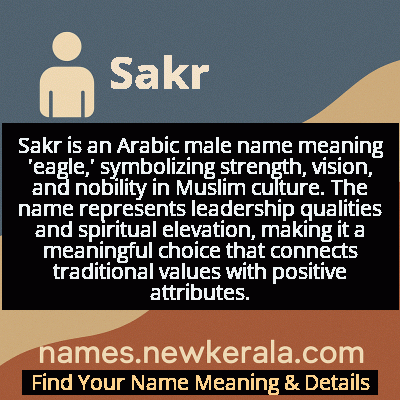Sakr Name Meaning & Details
Origin, Popularity, Numerology Analysis & Name Meaning of Sakr
Discover the origin, meaning, and cultural significance of the name SAKR. Delve into its historical roots and explore the lasting impact it has had on communities and traditions.
Name
Sakr
Gender
Male
Origin
Muslim
Lucky Number
4
Meaning of the Name - Sakr
Sakr is an Arabic male name meaning 'eagle,' symbolizing strength, vision, and nobility in Muslim culture. The name represents leadership qualities and spiritual elevation, making it a meaningful choice that connects traditional values with positive attributes.
Sakr - Complete Numerology Analysis
Your Numerology Number
Based on Pythagorean Numerology System
Ruling Planet
Uranus (Rahu)
Positive Nature
Strong sense of order, loyal, practical, and disciplined.
Negative Traits
Stubborn, overly serious, rigid, and prone to feeling restricted.
Lucky Colours
Blue, gray.
Lucky Days
Saturday.
Lucky Stones
Blue sapphire.
Harmony Numbers
1, 7, 8.
Best Suited Professions
Managers, engineers, accountants, organizers.
What People Like About You
Dependability, discipline, practicality.
Famous People Named Sakr
Sakr Al-Ghamdi
Quran Reciter
Renowned Saudi Quran reciter known for his beautiful voice and worldwide recognition
Sakr Al-Mutairi
Poet
Prominent Kuwaiti poet known for contributions to Arabic literature and Nabati poetry
Sakr Bin Malik
Historical Figure
Companion of Prophet Muhammad who participated in Battle of Badr and early Islamic conquests
Sakr Al-Qurashi
Scholar
Islamic scholar and historian known for works on early Islamic history and genealogy
Name Variations & International Equivalents
Click on blue names to explore their detailed meanings. Gray names with will be available soon.
Cultural & Historical Significance
Across centuries, Sakr has maintained its popularity as a name that embodies traditional Arab values of courage, nobility, and protection while reinforcing Islamic identity. The name appears frequently in classical Arabic poetry and literature as a metaphor for freedom, power, and national pride. In modern times, it continues to be chosen by Muslim families seeking names that connect children to their cultural heritage while instilling positive qualities. The enduring appeal of Sakr lies in its ability to bridge historical tradition with contemporary values, serving as a reminder of the importance of vision, strength, and spiritual elevation in both personal development and community leadership.
Extended Personality Analysis
Individuals named Sakr typically exhibit personality traits that reflect the eagle's symbolic characteristics - they are often perceived as natural leaders with strong vision and decisive action. Their thinking tends to be strategic and forward-looking, enabling them to see opportunities and challenges that others might miss. Like the eagle that surveys its domain from great heights, Sakrs often possess the ability to understand complex situations holistically and make informed decisions under pressure. They value independence and self-reliance, yet maintain deep loyalty to family and community, demonstrating protective instincts toward those they care about.
In social settings, Sakrs often command respect through their confidence and direct communication style. They tend to be honest and straightforward, valuing authenticity in relationships and having little patience for deception or manipulation. While they can appear reserved or serious initially, those who know them well often discover a deeply principled individual with strong moral convictions. Their resilience in facing challenges mirrors the eagle's ability to weather storms by flying above them, making Sakrs particularly effective in leadership roles during difficult times. These combined traits create a personality profile that balances strength with wisdom, independence with loyalty, and vision with practical action.
Modern Usage & Popularity
In contemporary naming practices, Sakr maintains a consistent presence across Muslim communities worldwide, particularly in Arab countries where it represents a traditional yet meaningful choice. While not among the most common names, it enjoys steady popularity among families seeking Arabic names with strong cultural and symbolic significance. The name has experienced renewed interest in recent decades as part of a broader revival of classical Arabic names that preserve cultural heritage while remaining relevant in modern society. In Western Muslim communities, Sakr serves as a distinctive choice that maintains cultural identity while being phonetically accessible to non-Arabic speakers. Digital globalization has helped sustain the name's relevance, with many modern bearers achieving recognition in diverse fields including technology, business, sports, and entertainment. Current naming trends show Sakr being chosen by parents who value both traditional roots and the positive attributes of strength, vision, and leadership that the name embodies.
Symbolic & Spiritual Meanings
The symbolic meanings associated with the name Sakr extend far beyond its literal translation as 'eagle,' encompassing rich layers of metaphorical significance across spiritual, personal, and cultural dimensions. Spiritually, the eagle's ability to soar to great heights represents the human aspiration toward enlightenment and closeness to the divine, symbolizing the soul's journey beyond earthly limitations. Its exceptional vision serves as a metaphor for wisdom, discernment, and the ability to perceive deeper truths that might escape ordinary observation. In personal development contexts, Sakr symbolizes independence, strength of character, and the courage to pursue one's path despite challenges or opposition. Culturally, the eagle has long represented freedom, national pride, and protective authority across many societies, making Sakr a name that embodies guardianship of tradition, family, and community values. These interconnected symbolic meanings create a comprehensive portrait of ideal human qualities - vision coupled with action, freedom balanced with responsibility, and strength guided by wisdom.

